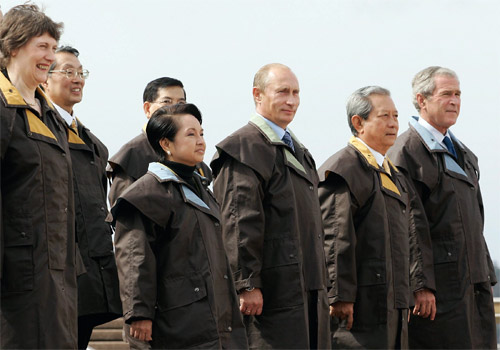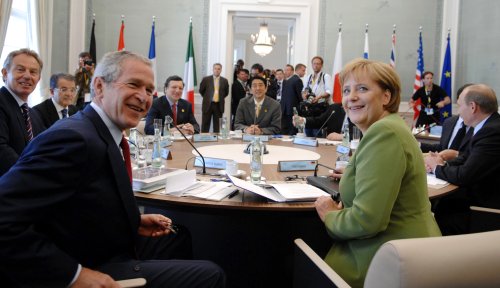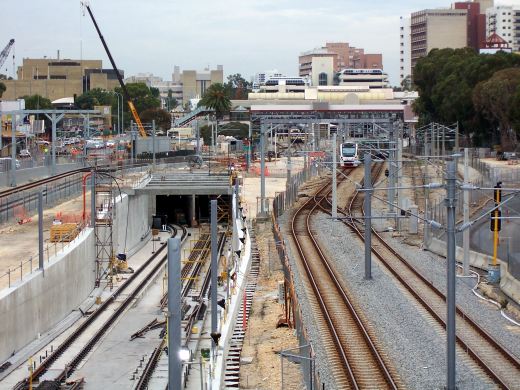- On the Bali summit, may I just say that while impassioned pleas are lovely and all, this is UN-style diplomacy, which means that getting any agreement is a huge deal. Expecting anything from said agreement, meanwhile, is probably a bit much. (Compare today’s victory in Europe, getting their watered-down constitution signed …)
- Domestically, the Ruddster’s approach to the NT indigenous community intervention launched by Team Howard a few months ago seems to be very softly-softly, wait-and-see. I guess this means the new government won’t be producing any useful policy for Aboriginal Australians after all (and particularly since the intervention never seemed that big a deal in the pre-election public consciousness).
- And one other thing: the Solomon Islands just lost their prime minister. It’ll be interesting to see how the Labor foreign policy team responds, since there are still Australian peacekeepers there. That said, I do so hope that the country remains stable, given the turmoil they’ve had in recent years.
Bali, the Territory, and the Solomons
Briefly: ministers, global warming, and the EAS
- As nice as it is that the Ruddster has gotten all tough for his new ministerial code of conduct, I do believe John Howard was really quite strict on his ministers too, for a while in 1996. But then he fired so many that he had to scale the rules back, and something tells me that Labor types aren’t any more wholesome and pure than Liberals …
- Also, the poor PM already seems to be having a hard time handling the global warming talks in Bali. And this is before any signs of progress emerge at all!
- Brendan Nelson’s new shadow ministry certainly seems to keep with his promise to be fresh and new, with Tony Abbot getting the demotion he probably deserved. It’ll be interesting to see if any of the new faces are competent in opposition, because I have no idea how they’d perform as real ministers.
- I never got a chance to write about the East Asia Summit, which was held in Singapore a fortnight ago. Pending a more thoughtful post, the news reports I’ve seen suggest that the biggest topic of discussion was climate change. It’s lovely to see more awareness of this issue, particularly from the Chinese (now Mr. Wen, can you fix the haze in Guangdong?), but it’s disappointing to see the EAS so distracted by it. With global warming being global and all, this isn’t the kind of issue that the institution was built to handle.
APEC 2007: spreading it nice and thin
This year’s APEC has brought news of so many deals, you could be forgiven for thinking the delegates tackled every big international issue under the sun … but of course, being jack of all trades usually means being master of none. And so it is that despite the rhetoric, the big-ticket announcement of the Sydney Declaration delivers no more than a bunch of hand-waving statements that are barely worth anything in seriously combating climate change.
The thing is, the Sydney Declaration actually is a decent achievement by APEC standards, which is why it overshadowed much more productive news like the deal between Australia and Indonesia to reduce wasteful burning of peat in Borneo.
The issue on which I was expecting to hear some argument was whether APEC should admit more countries, with the moratorium on new members expiring this year. Alternatively, this year would have been a great opportunity to focus APEC a bit by restricting membership with a strict definition like “must have a Pacific coastline”. Instead, the matter seems to have been swept under the carpet, with the only word in the Leaders’ Statement being a new moratorium that’ll run to 2010.
Meanwhile, the first of the long-touted trilateral dialogues between Australia, Japan, and the US was reportedly dominated by discussion of India, Michelle Bachelet of Chile gave an interesting speech, George Bush took a tiny positive step in handling North Korea, business groups adopted an anti-corruption pledge, and more good work was done in tackling the red tape that can stifle international trade.
But there’s been little motion on the bigger and more important question: how will APEC evolve in future? The hope from the early 90s of an enormous free-trade area seems moribund now, and if it is instead to continue the (probably more important) work of lessening regulatory barriers, why are delegates being distracted with things like weak climate change proclamations?
Two steps back … and half a step forward?
- Yesterday’s announcement from the G8 meeting sounds awesome: US$60 billion! For the Global Fund! Tackling the worst diseases facing Africa! Yet although this is good news, it actually represents only a little bit of new funding, and it’s being directed to programmes that have an annoying tendency to draw the focus away from other public health concerns (i.e. yay your town is HIV-free! but no we won’t fix your crumbling hospital).
- Among the other announcements from the G8 summit (including a very American-sounding statement about intellectual property) is an even greater non-event: on climate change, they’ve promised to enter discussions about what to do when the Kyoto Protocol expires, seeking “substantial global emission reductions” (which is as strong as the document gets). By normal standards of diplomacy I’d call this a success — but problem is, by the time normal diplomacy is finished, the battle may have already been lost.
- Unrelatedly, here I was thinking Paul Murray’s column on Thursday was bad. Today he highlights that newspaper’s endemic lack of clue towards the Internet: whilst pretending he knows what he’s on about, he waffles about “credibility” before selectively quoting The Assault on Reason (taking an entire sentence to dismiss why Al Gore thinks the Web is good for democracy), and froths at the mouth about celebrity gossip without noticing that the Internet is a wee bit bigger than the home pages of Australia’s commercial news services.
- Murray’s page was taken up yesterday by an infinitely more sensible article from former MP Phillip Pendal (who’s no saint, having once been anti-railway). He points out that the State Government ought to stop sitting on its hands with the Old Treasury Buildings and restore them to government offices, their original use. This really does make a lot of sense, particularly given how much office space the State rents and how horribly expensive that is in the current market. But its sensibility is exactly why I fear his proposal will be ignored.
- From today’s report about the not-yet-released masterplan for the Amarillo site, I observe that there’s basically nothing new. It’s a huge area of sprawled housing in a region with more new housing estates than you can poke a stick at, there’s suggestion of a dense centre that might be kinda cool (maybe), and there’s the mention of “possible light rail” that has accompanied every development south of Fremantle for as long as I can remember.
Update 14/6: I’d not noticed that the master plan has been buried on the DHW site for some days now.
Comparing some recent global warming policies
There’s been quite the flurry of stories about global warming in the news of late.
It reached a peak with last week’s report from the PM’s emissions trading task force, a document that doesn’t embrace science so much as hold it at bay except when absolutely needed. The report does at least acknowledge that the uncertainty of not planning for global warming delays investment in some areas, and therefore argues that Australia shouldn’t wait for a global system to be decided. But while it suggests committing immediately to an emissions cap, it doesn’t say what that should be, and Howard’s not made any suggestions (though he is already misquoting it).
Aside from the fact that the proposed cap-and-trade model starts very slowly (with free licences to pollute for “existing businesses identified as likely to suffer a disproportionate loss”), the report also suggests it should be one policy to rule them all — that “less efficient government policies need to be phased out”.
In this light, consider two State policies announced on Sunday against the climate change tokenism of the WA government: NSW shall be buying clean-fuel buses (done here years ago), while Queensland will spend $300 million on research and set a measly 10% target for renewable energy (although they will commit to cleaning up government buildings). Neither is all that great, but they don’t deserve to be sacrificed; Queensland’s policy at least puts some effort into much-needed research.
And at least it’s better than the Chinese government’s plan for climate change, an English version of which is here (hat-tip to David Reevely, who has an excellent overview). It basically repeats the subtext that can be seen in the Australian report (“waaah! it’ll hurt the economy!”) and focusses on things like improving efficiency and imposing regulations on manufacturers (not that I believe them; consider how easy it is to get local officials to look away). But of course, these are all things that need to be done anyway.
Australia hasn’t ratified Kyoto but has kept to target of 108% of 1990 emissions, while the Chinese failed on the self-imposed goal of 4% reduction in energy use divided by GDP (though that has decreased in the longer term). But even if they get to Western levels of efficiency, they’ll still be ramping up the number of polluting industrial facilities, which is why they should be embracing low-emissions technology now in areas like steelmaking and electricity generation. Indeed, theirs is a situation where nuclear power seems a decent solution: they need lots of energy, and can’t wait for solar panels to become cheap, but nobody wants them building hundreds more coal-fired generators that’ll pollute for decades.
And as an aside, given the concern in some quarters about WA’s boom coming to an end: I do believe that if the State government were to lift its silly ban, selling uranium to China would keep us prosperous for quite some time …
Fixing the city centre: not a State priority
The coverage of the State budget in today’s West Australian looks to me like little more than a jumble of ill-considered low blows — for example, Mike Nahan (who sounds increasingly like a Liberal lackey with every column) criticises it for not being as reformist as the Federal budget, without stopping to note that Tuesday’s biggest reform was allowing the ATO to pre-fill our tax returns so we can file with one click (great though it is, it’s hardly earth-shattering).
But today’s paper did reveal something that I didn’t have time to confirm yesterday: no funding has been allocated for the new footy stadium, the still-under-wraps foreshore development, or most worryingly, the Northbridge Link project. Assuming the project goes ahead, the earliest anything could happen is July 2008. And that would require it to be funded in next year’s budget — which may well focus on vote-buying measures for the February 2009 election instead.
So the vista above is likely to continue looking like that for a while. Possibly a long while. Now I know what Charles Landry was on about when he said that Perth’s immense potential is “blocked in innumerable energy-draining ways”.
(Also in the “budget WTF” category: the $100 million over five years that the Premier promised to deal with climate change looks all the more feeble when you realise that $88 million is to be spent in the next 12 months on our coal-fired power stations. In fairness, some of this will go to efficiency-improving measures, but it still makes the “commitment” look awfully lame.)







 Atom feed
Atom feed

